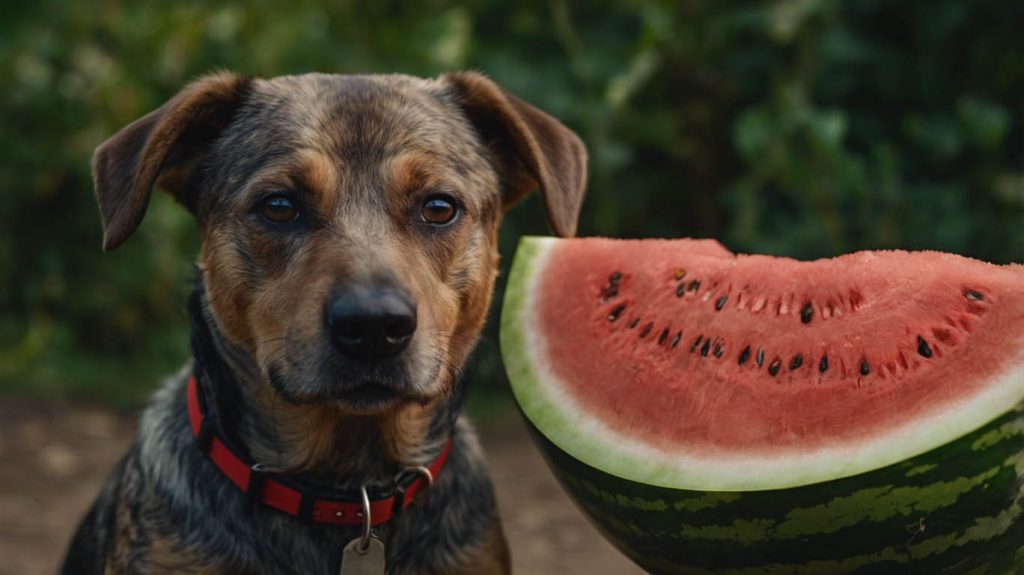Can Dogs Eat Watermelon Skin? The Ultimate Safety Guide for Dog Owners
Imagine you’re at a family barbecue, and after everyone has enjoyed their fill of juicy watermelon, the leftover rinds are piled up on a plate. Your dog, ever the hopeful opportunist, eyes the pile with interest. You pause before tossing it in the compost, wondering, “Can dogs eat watermelon skin?” It seems harmless enough—it’s part of a fruit, after all. However, this is a critical moment where a simple decision can have serious consequences for your pet’s health. The definitive answer from veterinarians is a firm and resounding no.
This comprehensive guide will tell the complete story of why this seemingly innocent scrap is a major hazard. We will begin by directly addressing the dangers, explaining in detail why the rind is unsafe. Subsequently, we will explore the specific risks it poses, from gastrointestinal upset to life-threatening blockages. Furthermore, we will provide you with a clear action plan for what to do if your dog accidentally ingests some. Consequently, you will understand not just the “what” but the “why,” empowering you to keep your dog safe around this popular summer treat.
Why the Answer to “Can Dogs Eat Watermelon Skin?” is a Resounding No
Before we delve into the specific dangers, it’s important to understand the fundamental problem. A dog’s digestive system is not designed to handle the tough, fibrous material that makes up a watermelon rind. Unlike the soft, watery flesh of the fruit, the skin (or rind) is incredibly difficult to break down. This simple fact is the foundation for all the potential risks and is the primary reason why asking “Can dogs eat watermelon skin?” is so important for their safety.

The Three Major Dangers When a Dog Eats Watermelon Skin
While the rind is not toxic in the way chocolate or grapes are, its physical properties make it a significant threat. The dangers can be categorized into three main areas, ranging from mild discomfort to a full-blown medical emergency.
1. Severe Gastrointestinal Upset
The most common and immediate consequence of a dog eating watermelon skin is significant digestive distress. Because the rind is so fibrous and hard to digest, it can easily irritate the lining of the stomach and intestines. This irritation can lead to a host of unpleasant symptoms, including:
- Vomiting
- Diarrhea
- Abdominal pain
- Gas and bloating
While usually not life-threatening, this experience is incredibly uncomfortable for your dog and can lead to dehydration if the vomiting and diarrhea are persistent.
2. The High Risk of Choking
This is a more acute and immediate danger. The watermelon rind is tough and rubbery. A dog, especially one that eats its food quickly, may try to gulp down a large piece without chewing it properly. This piece can easily become lodged in their esophagus, blocking their airway. A choking dog is a true emergency that requires immediate intervention. This risk alone is a powerful reason why the answer to can dogs eat watermelon skin is always no.
3. The Life-Threatening Danger of Intestinal Blockage
This is by far the most serious risk associated with a dog eating watermelon skin. If a dog manages to swallow a piece of the rind, it can travel down into the intestines and cause a blockage (or gastrointestinal obstruction). This is because the rind will not break down or soften. Instead, it can act like a plug, preventing food, water, and gas from passing through.
An intestinal blockage is a life-threatening emergency. The symptoms can include:
- Persistent vomiting (especially after eating or drinking)
- Severe lethargy and weakness
- Loss of appetite
- Abdominal pain and swelling (your dog may cry out if you touch their belly)
- Straining to defecate or an inability to have a bowel movement
If you suspect a blockage, you must contact your veterinarian or an emergency animal hospital immediately. This condition often requires major abdominal surgery to resolve. Reputable sources like the American Veterinary Medical Association (AVMA) emphasize the urgency of such situations.

What to Do if Your Dog Accidentally Eats Watermelon Skin
Accidents can happen in the blink of an eye. If you discover your dog has eaten some watermelon rind, follow these steps.
- Don’t Panic and Assess the Situation: First, determine how much they ate and the size of the pieces, if you can. Also, note the size of your dog. A Great Dane eating a tiny sliver is very different from a Yorkie eating a large chunk.
- Contact Your Veterinarian: This is the most crucial step. Call your vet, explain the situation, and follow their professional advice. They may tell you to simply monitor your dog, or they may ask you to bring them in for an examination, especially if a large amount was consumed.
- Monitor for Symptoms: Watch your dog closely for the next 24-72 hours. Keep a close eye out for any of the signs of GI upset or blockage listed above. Knowing the answer to can dogs eat watermelon skin is only half the battle; knowing what to do afterward is just as critical.
The Safe and Healthy Alternative: The Watermelon Flesh
Just because the skin is off-limits doesn’t mean your dog has to miss out on all the fun! The pink, fleshy part of the watermelon, when prepared correctly, is a wonderfully healthy and hydrating treat.
How to Safely Serve Watermelon
- Completely Remove the Rind: Cut away all of the green and white parts of the rind.
- Remove All Seeds: The hard, black seeds can also cause an intestinal blockage, so they must be removed.
- Cut into Bite-Sized Cubes: Dice the fruit into small, manageable pieces to prevent choking.
- Serve in Moderation: Treats should only make up about 10% of your dog’s daily diet.
For more ideas on healthy snacks, check out our guide on [Safe Fruits and Vegetables for Dogs].
The Final Verdict on Watermelon Skin for Dogs
So, let’s revisit our core question one last time: Can dogs eat watermelon skin? The verdict from veterinary experts is clear and unequivocal: No. The tough, indigestible rind poses serious risks of gastrointestinal upset, choking, and life-threatening intestinal blockages. The story is simple—the flesh is a healthy treat, while the skin is a dangerous hazard. By taking the simple step of discarding the rind in a secure place, you can ensure that watermelon remains a safe and delightful summer snack for you and your beloved pet.
Have you ever had a close call with your dog eating something they shouldn’t have? Share your story or ask a question in the comments below. For a complete list of foods to avoid, don’t miss our essential guide on [What Human Foods Are Toxic to Dogs: A Vet’s List].


